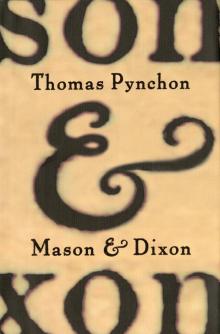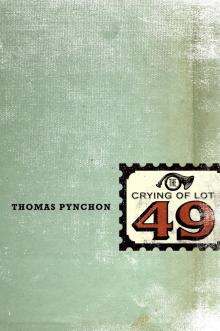- Home
- Thomas Pynchon
Mason & Dixon Page 3
Mason & Dixon Read online
Page 3
“Long life to Kings!” cry several sailors.
“Aye and to Cooch Girls!”
“— and Coconut-Ale!”
“Hold,” cautions Mason. “I’ve heard they eat dogs out there.”
“Wrap ’em in palm leaves,” Dixon solemnly, “and bake ’em on the beach . . . ?”
“First time you turn your back,” Mason warns, “that Dog’s going to be some Savage’s Luncheon.”
“Rrrrrraahff! Excuse me?” says the Learnèd D., “as I seem to be the Topick here, I do feel impelled, to make an Observation?”
“That’s all right, then, Fido,” Bodine making vague petting motions, “— trust us, there’s a good bow-wow. . . .”
A small, noisy party of Fops, Macaronis, or Lunarians,— it is difficult quite to distinguish which,— has been working its way up the street and into Ear-shot. Thro’ several window-panes, moving candlelight appears. Hostlers roll about disgruntled upon feed-sack Pillows and beds. Unengaged Glim-jacks look in, to see if they can cast any light on matters.
The Dog pushes Mason’s Leg with his Head. “We may not have another chance to chat, even upon the Fly.”
“There is something I must know,” Mason hoarsely whispers, in the tone of a lover tormented by Doubts, “— Have you a soul,— that is, are you a human Spirit, re-incarnate as a Dog?”
The L.E.D. blinks, shivers, nods in a resign’d way. “You are hardly the first to ask. Travelers return’d from the Japanese Islands tell of certain religious Puzzles known as Koan, perhaps the most fam’d of which concerns your very Question,— whether a Dog hath the nature of the divine Buddha. A reply given by a certain very wise Master is, ‘Mu!’ ”
“ ‘Mu,’” repeats Mason, thoughtfully.
“It is necessary for the Seeker to meditate upon the Koan until driven to a state of holy Insanity,— and I would recommend this to you in particular. But please do not come to the Learnèd English Dog if it’s religious Comfort you’re after. I may be præternatural, but I am not supernatural. ’Tis the Age of Reason, rrrf? There is ever an Explanation at hand, and no such thing as a Talking Dog,— Talking Dogs belong with Dragons and Unicorns. What there are, however, are Provisions for Survival in a World less fantastick.
“Viz.— Once, the only reason Men kept Dogs was for food. Noting that among Men no crime was quite so abhorr’d as eating the flesh of another human, Dog quickly learn’d to act as human as possible,— and to pass this Ability on from Parents to Pups. So we know how to evoke from you, Man, one day at a time, at least enough Mercy for one day more of Life. Nonetheless, however accomplish’d, our Lives are never settled,— we go on as tail-wagging Scheherazades, ever a step away from the dread Palm Leaf, nightly delaying the Blades of our Masters by telling back to them tales of their humanity. I am but an extreme Expression of this Process,— ”
“Oh I say, Dog in Palm Leaf, what nonsense,” comments one of the Lunarians, “— really, far too sensitive, I mean really, Dog? In Palm Leaf? Civiliz’d Humans have better things to do than go about drooling after Dog in Palm Leaf or whatever, don’t we Algernon?”
“Could you possibly,” inquired the Terrier, head cocked in some Annoyance, “not keep saying that? I do not say things like, ‘Macaroni Italian Style,’ do I, nor ‘Fop Fricasée,’— ”
“Why, you beastly little— ”
“Grrrr! and your deliberate use of ‘drooling,’ Sir, is vile.”
The Lunarian reaches for his Hanger. “Perhaps we may settle this upon the spot, Sir.”
“Derek? You’re talking to a D-O-G?”
“Tho’ your weapon put me under some Handicap,” points out the Dog, “in fairness, I should mention my late feelings of Aversion to water? Which may, as you know, signal the onset of the Hydrophobia. Yes! The Great H. And should I get in past your Blade for a few playful nips, and manage to, well, break the old Skin,— why, then you should soon have caught the same, eh?” Immediately ’round the Dog develops a circle of Absence, of about a fathom’s radius, later recall’d by both Astronomers as remarkably regular in shape. “Nice doggie!”“ ’Ere,— me last iced Cake, that me Mum sent me all ’e way from Bahf. You take i’.” “What think yese? I’ll give two to one the Fop’s Blood’ll be first to show.”
“Sounds fair,” says Fender Bodine. “I fancy the Dog,— anyone else?”
“Oughtn’t we to summon the Owners . . . ?” suggests Mr. Dixon.
The Dog has begun to pace back and forth. “I am a British Dog, Sir. No one owns me.”
“Who’re the Gentleman and Lady who were with you in the Assembly Room?” inquires Mason.
“You mean the Fabulous Jellows? Here they come now.”
“Protect you from sailors?” wails Mrs. Jellow, approaching at a dead run over the treacherous Cobbles of the Lane, “Oh, no, thank you, that was not in our Agreement.” Her husband, pulling on his Breeches, Wig a-lop, follows at a sleepy Amble. “Now you apologize for whatever it was you did, and get back in that Stable in your lovely straw Bed.”
“We were wondering, Ma’am,” Bodine with his hat off, quavering angelically, “would the li’oo Doggie be for sale?”
“Not at any price, Topman, and be off wi’ you, and your rowdy-dowing Flock as well.” At her Voice, a number of Sailors in whose Flexibility lies their Preservation from the Hazards of Drink, are seen to freeze.
“Do not oppose her,” Jellow advises, “for she is a first-rate of an hundred Guns, and her Broadside is Annihilation.”
“Thankee, Jellow,— slow again, I see.”
“Oh dear,” Bodine putting his hat back on and sighing. “Apologies, Sir and Madam, and much Happiness of your Dog.”
“You are the owners of this Marvel?” inquires Mason.
“We prefer ‘Exhibitors,’” says Mr. Jellow.
“Damme, they’d better,” grumphs the Dog, as if to himself.
“Why, here is The Pearl of Sumatra!” calls Dixon, who for some while has been growing increasingly desperate for a Drink, “And a jolly place it seems.”
“Fender-Belly is buying!” shouts some mischievous Sailor, forever unidentified amid the eager Rush for the Entry of this fifth- or sixth-most-notorious sailors’ Haunt upon the Point, even in whose Climate of general Iniquity The Pearl distinguishes itself, much as might one of its Eponyms, shining ’midst the decadent Flesh of some Oyster taken from the Southern Sea.
“How about a slug into y’r Breadroom, there, Fido?”
“Pray you, call me Fang. . . . Well, and yes I do like a drop of Roll-me-in-the-Kennel now and then. . . .”
Inside, seamen of all ranks and ratings mill slowly in a murk of pipe-smoke and soot from cheap candles, whilst counter-swirling go a choice assortment of Portsmouth Polls in strip’d and floral Gowns whose bold reds, oranges, and purples are taken down in this light, bruised, made oily and worn, with black mix’d in everywhere, colors turning ever toward Night. Both Gentlemen note, after a while, that the net Motion of the Company is away from the Street-Doors and toward the back of the Establishment, where, upon a length of turf fertiliz’d with the blood and the droppings of generations of male Poultry, beneath a bright inverted Cone of Lanthorn-Light striking blue a great ever-stirring Knot of Smoke, and a Defaulter merry beyond the limits of cock-fight etiquette suspended in a basket above the Pit, a Welsh Main is in progress. Beyond this, a Visto of gaming tables may be made out, and further back a rickety Labyrinth of Rooms for sleeping or debauchery, all receding like headlands into a mist.
The Learnèd D., drawn by the smell of Blood in the Cock-Pit, tries to act nonchalant, but what can they expect of him? How is he supposed to ignore this pure Edge of blood-love? Oh yawn yes of course, seen it all before, birds slashing one another to death, sixteen go in, one comes out alive, indeed mm-hmm, and a jolly time betwixt, whilst the Substance we are not supposed to acknowledg
e drips and flies ev’rywhere. . . . “There, Learnèd,” calls Mrs. Jellow brusquely, “we must leave the birds to their Work.” Beneath the swaying Gamester, the general pace of the Room keeps profitably hectic. From the Labyrinth in back come assorted sounds of greater and lesser Ecstasy, along with percussions upon Flesh, laughter more and less feign’d, furniture a-thump, some Duetto of Viol and Chinese Flute, the demented crowing of fighting-cocks waiting their moment, cries in Concert at some inaudible turn of a card or roll of the Fulhams high and low, calls for Bitter and Three-Threads rising ever hopeful, like ariettas in the shadow’d Wilderness of Rooms, out where the Lamps are fewer, and the movements deeper with at least one more Grade of Intent . . . At length the Dog halts, having led them to where, residing half out of doors, fram’d in cabl’d timbers wash’d in from a wreck of long ago, an old piece of awning held by a gnaw’d split, ancient Euphroe between her and the sky with its varied Menace, sits Dark Hepsie, the Pythoness of the Point.
“Here,” the Dog butting at Mason, “here is the one you must see.”
Instantly, Mason concludes (as he will confess months later to Dixon) that it all has to do with Rebekah, his wife, who died two years ago this February next. Unable to abandon her, Mason is nonetheless eager to be aboard a ship, bound somewhere impossible,— long Voyages by sea being thought to help his condition, describ’d to him as Hyperthrenia, or “Excess in Mourning.” Somehow the Learnèd Dog has led him to presume there exist safe-conduct Procedures for the realm of Death,— that through this Dog-reveal’d Crone, he will be allow’d at last to pass over, and find, and visit her, and come back, his Faith resurrected. That is as much of a leap as can be expected of a melancholick heart. At the same time, he smoaks that the Learnèd English D.,— or Fang, as now he apparently wishes to be known,— in introducing them thus, is pursuing an entirely personal End.
“Angelo said there’d be a Package for me?”
“Quotha! Am I the Evening Coach?” The two rummage about in the Shadows. “Look ye, I’ll be seeing him later, and I’ll be sure to ask,— ”
“Just what you said last time,” the Dog shaking his head reprovingly.
“Here, then,— a Sacrifice, direct from me own meager Mess, a bit of stew’d Hen,— ’tis the best I can do for ye today.”
“Peace, Grandam,— reclaim thy Ort. The Learnèd One has yet to sink quite that low.” The Dog, with an expressive swing of his Head, makes a dignified Exit, no more than one wag of the Tail per step.
“Your ship will put to Sea upon a Friday,” Hepsie greets Mason and Dixon, “— would that be a Boatswain’s Pipe into the Ear of either of you Gents?”
“Why, the Collier Sailors believe ’tis bad luck . . . ?” Dixon replies, as if back at Woolwich before his Examiners, “it being the day of Christ’s Execution.”
“Nicely, Sir. Thus does your Captain Smith disrespect Christ, Fate, Saint Peter, and the god Neptune,— and withal there’s not an insurancer in the Kingdom, from Lloyd’s on down, who’ll touch your case for less than a sum you can never, as Astronomers, possibly afford.”
“Yet if we be dead,” Dixon points out, “the Royal Navy absorbing the cost of a burial at sea, what further Expenses might there be?”
“You are independent of a Family, Sir.”
“Incredible! Why, you must be a very Scryeress . . . ?” Dixon having already spied, beneath her layers of careful Decrepitude (as he will later tell Mason), a shockingly young Woman hard at work,— with whom, country Lout that he is, he can’t keep from flirting.
But Mason is now growing anxious. “Are we in danger, then? What have you heard?”
Silently she passes him a soil’d Broadside Sheet, upon which are printed descriptions of varied Services, and the Fees therefor. “What’s this? You won’t do Curses?”
“My Insurance? Prohibitive,” she cackles, as the young fancy the old to cackle. “I believe what you seek is under ‘Intelligence, Naval.’ ”
“Half a Crown?”
“If you insist.”
“Ehm . . . Dixon?”
“What? You want me to put in half of thah’?”
“We can’t very well charge . . . this . . . to the Society, can we?”
“Do I shame you, Sir?” Hepsie too ’pert by Decades.
“Oh, all right,” Mason digging laboriously into his Purse, sorting out Coins and mumbling the Amounts.
Dixon looks on in approval. “You spend money like a very Geordie. He means no harm, lass . . . ?” beaming, nudging Mason urgently with his Toe, as Bullies shift about in the Dark, and Boats wait with muffl’d Oars to ferry them against their will over to a Life they may not return from. The smell of the great Anchorage,— smoke, Pitch, salt and decay,— sweeps in fitfully.
“Sirs, attend me,” the coins having silently vanish’d, “— Since last year, the Year of Marvels, when Hawke drove Conflans upon that lee shore at Quiberon Bay, the remnants of the Brest fleet have been understandably short of Elan, or Esprit, or whatever they style that stuff over there,— excepting, now and then, among the Captains of smaller Frigates, souls as restless to engage in personal Tactics as dispos’d to sniff at national Strategy. Mortmain, Le Chisel, St.-Foux,— mad dogs all,— any of them, and others, likely at any time to sail out from Brest, indifferent to Risk, tête-á-tête as ever with the end of the World, seeking new Objects of a Resentment inexhaustible.”
“Oh dear,” Mason clutching his head. “Suppose . . . we sail upon some other Day, then?”
“Mason, pray You,— ’tis the Age of Reason,” Dixon reminds him, “we’re Men of Science. To huz must all days run alike, the same number of identical Seconds, each proceeding in but one Direction, irreclaimable . . . ? If we would have Omens, why, let us recall that the Astronomer’s Symbol for Friday is also that of the planet Venus herself,— a good enough Omen, surely . . . ?”
“I tell you,” the young Impostress merrily raising a Finger, “French Frigates will be where they will be, day of the week be damn’d,— especially St.-Foux, with La Changhaienne. You know of the Ecole de Piraterie at Toulon? Famous. He has lately been appointed to the Kiddean Chair.”
Mason and Dixon would like to stay, the one to fuss and the other to flirt, but as they now notice, a considerable Queue has form’d behind them. There are
Gamesters in Trouble, Sweet-Hearts untrue,
Sailors with no one to bid them adieu,
Roistering Fops and the Mast-Pond Brigade, all
Impatient to chat with the Sibylline Maid, singing,
Let us go down, to Hepsie’s tonight,
Maybe tonight, she’ll show us the Light,—
Maybe she’ll cackle, and maybe she’ll cry,
But for two and a kick she won’t spit in your Eye.
She warn’d Ramillies sailors, Beware of the Bolt,
And the Corsica-bound of Pa-oli’s Revolt,—
From lottery Tickets to History’s End,
She’s the mis’rable, bug-bitten sailor’s best friend, singing,
Let us go down, &c.
“Nice doing Business with you, Boys, hope I see yese again,” with an amiable Nod for Dixon.
Back at the Cock-fights, Fender-Belly Bodine comes lurching across their bow, curious. “So what’d she have to say?”
Something about crazy Frigate Captains sailing out of Brest, is all either of them can remember by now.
“Just what she told my Mauve, and for free. Good. We’ll have a fight, Gents. And if it’s Le Chisel, we’ll have a Stern-chase, too. Back on old H.M.S. Inconvenience, we wasted many a Day and Night watching that fancy Counter get smaller by the minute. And when he’d open’d far enough from us, it pleas’d him to put out the Lanthorn in his Cabin, as if to say, ‘Toot fini, time to frappay le Sack.’ Skipper saw that light go out, he always mutter’d the same thing,— ‘The Dark take
you, Le Chisel, and might you as readily vanish from my Life,’— and then we’d slacken Sail, and come about, and the real Work would begin,— beating away, unsatisfied once more, against the Wind.” Foretopman Bodine pausing to squeeze the nearest Rondures of a young Poll who has shimmer’d in from some Opium Dream in the Vicinity. Like Hepsie, Mauve is far from what she pretends. Most men are fool’d into seeing a melancholy Waif, when in reality she’s the most cheerful of little Butter-Biscuits, who has escap’d looking matronly only thanks to that constant Exertion demanded by the company of Sailors. She and Hepsie in fact share quarters in Portsea, as well as a Wardrobe noted, even here upon the Point, for its unconsider’d use of Printed Fabricks.
“She’s a wonderful old woman, ’s Hepsie,” says Mauve. “Fortunes have been won heeding her advice, as lost ignoring it. She tells you beware, why, she has reckon’d your Odds and found them long. . . . She is Lloyd’s of Portsmouth. Believe her.”
Later, around Dawn, earnestly needing a further Word with Hepsie or the Dog, Mason can find no trace of either, search as he may. Nor will anyone admit to knowing of them at all, let alone their Whereabouts. He will continue to search, even unto scanning the shore as the Seahorse gets under way at last, on Friday, 9 January 1761.
4
Had it proved of any help that the Revd had tried to follow the advice of Epictetus, to keep before him every day death, exile, and loss, believing it a condition of his spiritual Contract with the world as given? When the French sail came a-twinkling,— with never-quite-invisible death upon the Whir fore and aft, with no place at all safe and only the unhelpful sea for escape, amid the soprano cries of the powder-monkeys, the smell of charr’d wood, the Muzzle’s iron breath,— how had these daily devotions, he now wondered, ultimately ever been of use, how, in the snug Shambles of the Seahorse?
To the children, he remarks aloud, “Of course, Prayer was what got us through.”
“I should have pray’d,” murmurs Cousin Ethelmer, to Tenebræ’s mild astonishment. Since appearing in the Doorway during a difficult bit of double-Back-stitch Filling two Days ago, return’d from College in the Jerseys, he has been otherwise all Boldness.

 Mason & Dixon
Mason & Dixon Against the Day
Against the Day Uncollected Works
Uncollected Works Bleeding Edge
Bleeding Edge Gravity's Rainbow
Gravity's Rainbow The Crying of Lot 49
The Crying of Lot 49 V.
V. Inherent Vice
Inherent Vice Vineland
Vineland